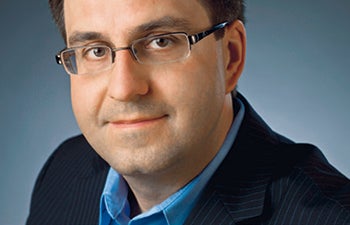
New Quantitative Biology major trains life sciences students to parse the numbers
Nearly four decades ago, Douglas Adams, author of The Hitchhiker’s Guide to the Galaxy, famously provided “the Answer to the Great Question of Life, the Universe, and Everything.” It was 42.
In the real world, of course, the numbers behind the mystery of life are infinitely more complex, nuanced and copious than Adams’ farcical solution. Life sciences researchers are generating vast amounts of information, and with it an ever increasing need for exceptional analytical skills to elicit meaning from the data. USC Dornsife’s new major in quantitative biology — one of the first of its kind in the country — is designed to give students those skills.
Quantitative biology, or QBIO, uses computer algorithms, mathematics and critical thinking techniques to find meaning in the large amounts of data generated in biological experiments. Modern studies in molecular biology, neurobiology, environmental biology, ecology, marine biology, and other branches of the field all reveal a level of complexity that few early scientists could have imagined.
“Biology has really become a quantitative science,” said Remo Rohs, professor of biological sciences, chemistry, physics and astronomy, and computer science at USC Dornsife. “A modern biologist generates data and needs to effectively analyze that data.”
Rohs, who is also vice chair of biological sciences and head of computational biology and bioinformatics, said the major is designed to train students to be both high-level biologists and high-level data analysts. Toward that aim, it includes courses in computer science and in the quantitative sciences such as mathematics, chemistry and physics, in conjunction with biology courses.
Rohs explained that QBIO bridges the space between biology, data science, and engineering, where much of today’s biology research falls.
“Some of our students were wondering, ‘Is biology right for me, or do I want to be in computer science?’ I think what lots of people these days do is study at that interface,” he said. As a result, the major includes several courses based at USC Viterbi School of Engineering.
“The QBIO major brings together the computer science expertise we have at USC Viterbi with USC Dornsife’s strengths in science and mathematics,” said Gaurav Sukhatme, Gordon S. Marshall Chair in Engineering and professor and chair of computer science at USC Viterbi. “This combination is a powerful foundation for students seeking futures in biology research.”
Rohs co-led the committee that designed the new major with Michael Waterman, University Professor, USC Associates Chair in Natural Sciences, and professor of biological sciences, computer science, and mathematics. The QBIO curriculum encompasses a range of existing classes as well as a first newly designed course, QBIO 105, “Introduction to Quantitative Biology Seminar,” which provides an overview of the methods, goals, applications and significance of the discipline. Additionally, students conduct research under the guidance of an adviser and produce an honors thesis.

Remo Rohs. Photo by John Livzey.
“As few institutions offer a comprehensive undergraduate degree program in this emerging field, USC Dornsife students will be well-positioned to lead discovery processes at the promising intersection of technology and biological science,” said Dean Amber D. Miller.
The training provided by the QBIO major gives students tools they can take in a number of career directions.
“A major such as this one, that provides critical thinking skills as well as the technological know-how that modern biological science requires, is an invaluable addition to the USC curriculum,” said Steve Kay, Provost Professor of Neurology, Biomedical Engineering and Biological Sciences and director of convergent bioscience at USC. “Students who are successful in QBIO will be well-equipped to excel not just in research but in any profession.”
The QBIO major will begin accepting students this Fall. Both incoming freshmen and current students may apply. Rohs said many students have already expressed interest in the new major.
“We only want to accept students that really are hungry to learn the two sides,” he said. “The classes are more challenging, but I think somebody coming out of this major, who has excelled in the more substantive training, will succeed. I see those as the students that will go on to excel in graduate or medical school, industry, or whichever path they choose.”
Questions about this major can be directed to Rohs via email at rohs@usc.edu.
Online resources for the Bachelor of Science in Quantitative Biology include the course plan and curriculum.